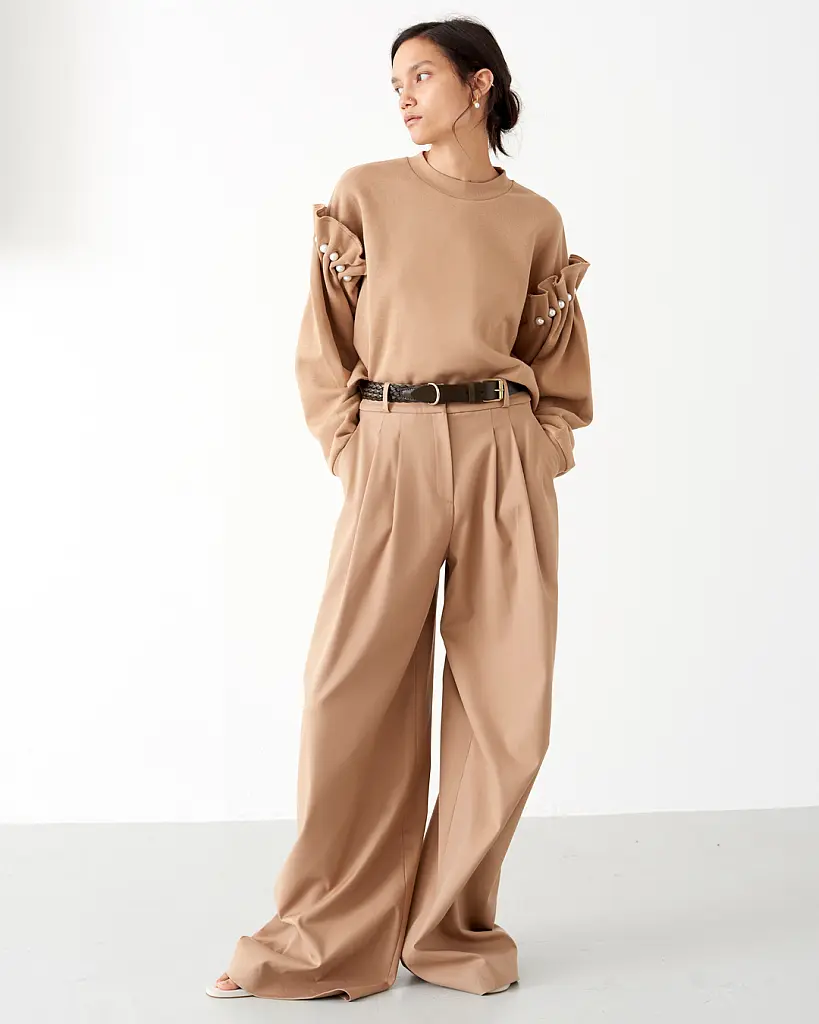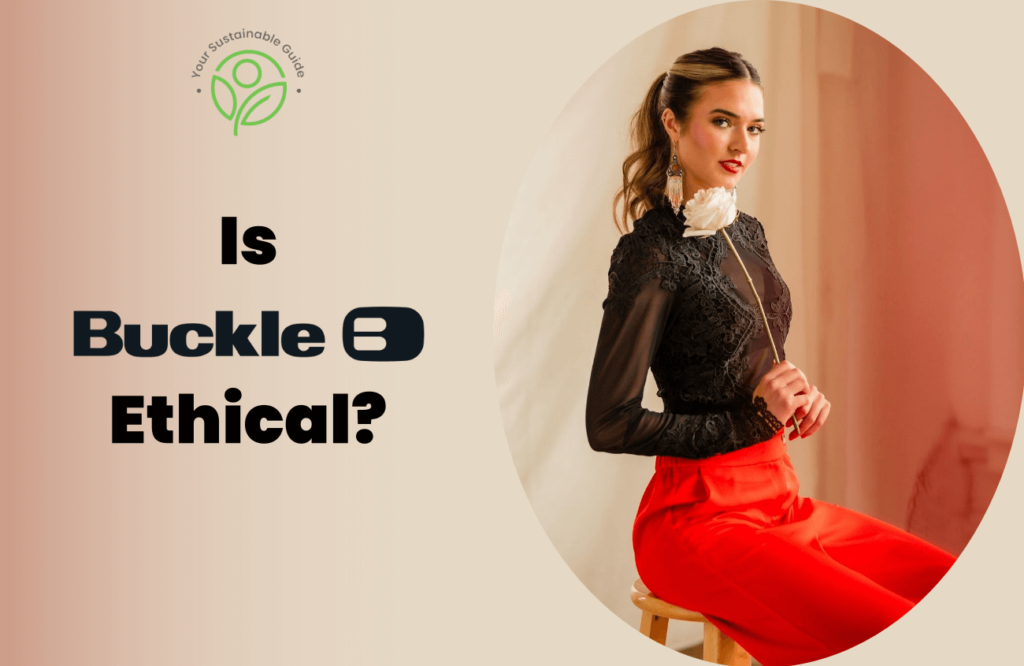If structured cuts and statement styles allure you, then Mother of Pearl might be the perfect label for you. Based in the UK, Mother of Pearl is home to sustainable luxury womenswear designed in London and manufactured in global artisan factories. Operating under the leadership of Amy Powney, its contemporary collections celebrate individuality and authenticity. But as eco-friendly as it claims to be, is it ethical enough? Let’s find out whether Mother of Pearl is a fast fashion brand or a truly eco-conscious company that curates clothing without compromising on ethics or environmental responsibility.

Is Mother Of Pearl Fast Fashion?
No, Mother of Pearl is not a fast fashion brand. Instead, it’s on a mission to slow down the fast fashion industry. Unlike typical fast fashion labels that flood the market with countless trending styles weekly, Mother of Pearl takes a different approach. It creates sophisticated and timeless capsule collection apparel designed to become wardrobe staples and your favorite pieces for years to come.
At Mother of Pearl, garments are priced at a premium rate, making them appealing to consumers seeking quality over quantity. Back in 2018, Mother of Pearl launched its first sustainable line of core classics in the collection “No Frills”. And even today, the Core Collection takes inspiration from the “No Frills” design concept that is built on curating forever styles. For new additions, a small number of suave styles are added every 1-2 months under their seasonal collections.
As a sustainable luxury label, Mother of Pearl emphasizes circularity through its partnership with SOJO in the UK, offering high-quality alterations to promote circular fashion. Additionally, it actively incorporates sustainable recycled and natural materials, demonstrating a commitment to responsible operations.
Mother of Pearl’s efforts to channel an ethical supply chain further set it apart, making it a conscious choice for those desiring a chic and lasting wardrobe.

Is Mother of Pearl Ethical?
Yes, Mother of Pearl is dedicated to ethical practices. It cares deeply about the well-being of the people involved in its supply chain. It maintains transparency by publishing details about each of its garment manufacturers. Plus, it lists out the fabric and yarn mills and the products they supply as well.
Labor Practices
The majority of Mother of Pearl’s final production phase happens in Portugal, a country with a medium risk of labor abuse. However, the brand doesn’t have a Code of Conduct mandated for its partner suppliers. It has just published a generic social responsibility page addressing workers’ rights and well-being.
Mother of Pearl mentions working closely with its factories to supervise the entire production process. It also conducts audits by regularly visiting these facilities to ensure all ethical standards are met.
Now, given Mother of Pearl’s passion towards protecting the people and the planet, these declarations can be trusted because some of its factories are certified. But not all of them. Therefore, it’s important to guarantee that every worker in its supply chain is treated with respect, offered fair wages, and a safe working setup. So, it would be wise for Mother of Pearl to publish detailed information about its supply chain.
Sourcing Practices
Mother of Pearl doesn’t have its own factories. It partners with responsible suppliers and manufacturers to source its garments. It mainly works with European facilities in Portugal, Italy, Spain, etc. However, some of its facilities are also located in Asian countries like China. Considering China’s history of labor rights violations, it is essential for the label to trace all of its factories in the country. Because many luxury brands that use sweatshops turn to China for cheap manufacturing.
The positive aspect is, most of Mother of Pearl’s supply chain is traceable. You can find information about production details under Sustainable Attribute- ‘Fibre to Final’ for most of its garments. While validation of end-to-end fair labor standards is still due, Mother of Pearl’s efforts are commendable.
Child Labor
Mother of Pearl has never been engaged in child labor rumors. The company carefully selects and maintains long-standing relationships with responsible suppliers that abide by its ethics policies. In addition, audits are done on a frequent basis to verify no labor laws, such as employing minors, are violated.
Utilizing child labor in the fast fashion industry is a widespread occurrence. But with Mother of Pearl as a sustainable and slow fashion brand, it can be expected that its factories don’t engage in such unlawful activities.
Overall Rating:3
Is Mother of Pearl Cruelty Free?
Yes, Mother of Pearl is cruelty-free and is driven towards animal welfare. It doesn’t use animal-derived textiles like silk, tanned leather, fur, angora, exotic animal hair or skin. However, sheep wool is a staple material in its sustainable collections.
As a compassionate label, Mother of Pearl understands the cruelty involved in the wool industry. Therefore, it solely uses non-mulesed wool sourced from an ethical supplier in Portugal. The sheep in this farm are allowed to roam freely around the plateaus of the Serra da Estrela. Plus, they are treated humanely and sheared by hand to prevent causing any distress.
Overall Rating: 4

Is Mother of Pearl Sustainable?
Yes, Mother of Pearl is sustainable. Its garments are made from a variety of eco-friendly materials, such as GOTS organic cotton, responsible wool, cupro, and TENCEL lyocell. This deliberate selection comes from their awareness of the environmental impact of synthetic fibres. The label strictly avoids petroleum-based fibres like polyester as it lacks efficient recycling infrastructure and contributes to environmental pollution.
Mother of Pearl prioritizes virgin and recycled natural fibres in their everyday wear for a conscious production process. Even when synthetic fabrics are necessary, they exclusively use recycled synthetics, as it’s an amazing way to repurpose existing textile waste. Some of its knitwear and dresses consist of recycled materials certified by Global Recycled Standard. And the label makes continuous efforts to increase the use of these fabrics in its future collections.
Additionally, Mother of Pearl also uses some sustainable materials in their raw state whenever possible. This approach significantly helps to reduce harmful toxic dyes and chemical processing. Their Ecru denim collection is one such example. Plus, the label doesn’t discard its leftover fabrics and trims. Instead, it gives them a new life by making them a part of upcoming designs.
Mother of Pearl strongly focuses on raw material innovations for low-impact production techniques. It has implemented an OZONE treatment for denim in its Portugal factory. This method reduces water usage in jeans manufacturing by about 50% and minimizes energy, chemicals, enzymes, and stones. The brand prioritizes longevity and functionality, ensuring that each garment is designed not only for sustainability but also for enduring style.
Moreover, Mother of Pearl’s ‘Fiber to Final’ manufacturing model further decreases its carbon footprint. For instance, organic cotton for denim undergoes the entire production cycle in a single country, significantly lowering CO2 emissions related to transportation. Advocating for “Repair, Reuse and Recycle”, this brand is an avid practitioner of circular fashion. It also provides garment care instructions on its website to guide you in maintaining your clothes for an extended life.
Mother of Pearl is incredibly transparent about its sustainable practices. However, it would be great to see some data on how it measures and controls its greenhouse gases.
Overall Rating: 4







